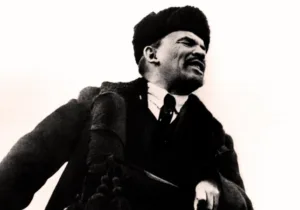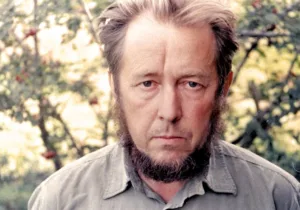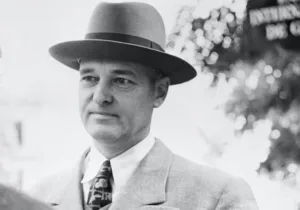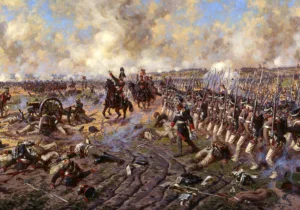Contributors to Providence need not feel pressured to write the most influential article about U.S. foreign policy of all time, for that essay has already been written. George F. Kennan first sent his secret “Long Telegram” to Washington in 1946 with his later, slightly amended, appeared in the July, 1947 issue of Foreign Affairs as “The Sources of Soviet Conduct.” Because Kennan was still serving in the U.S. Foreign Service, his anonymous byline was simply “X.” Everyone really knew who wrote it. The prematurely balding, deeply studious, 43-year-old Kennan was one of those now regarded as The Wise Men in the formation of U.S. foreign policy in the early post-war years.
Interestingly, Kennan did not shrink from the word (or the world view) of Providence. Almost casually, he ended his article with a flourish. He concludes by saying Americans should have “gratitude to a Providence which… has made their entire security as a nation dependent on their pulling themselves together and accepting the responsibilities of moral and political leadership that history plainly intended them to bear.” But even as he gestured to Providence, the bulk of his article was hard-headed realism about Soviet aggression.
He explained Marxism as the philosophy of Communism. It is the long, turgid volumes of dialectical materialism that lead the world movement for Socialist rule. It will always be driven by scientific and inexorable forces. Vorwärts was Marx’s German word for forward. Since the end goal of Communism is only to be realized in the future, Communists must always avert their eyes from crimes, mass murders, as well as environmental, social, religious, and political catastrophes (катастрофа.) For Marxists, this was all inevitable; Lenin simply applied an electric prod to Marx’s airy philosophy.
Lenin was “the prophet armed.” Lenin had seen his older brother hanged by the Tsar he had tried to assassinate. He had also studied the failure of the world’s first Communist revolution—the Paris Commune of 1870-71. Lenin would conclude that the reason History with a capital H was not realized was that the Communards were not bloody enough. Terror thus became not a regrettable necessity, but an indispensable part of Communist rule. “Communism is nothing more than atheism with a knife at your child’s throat,” Solzhenitsyn told us. Marx ruled the revolutionary mind with ink. Lenin wrote History in blood.
This, Kennan taught us, is why the USSR could not be tamed with kind gestures or humane impulses. Franklin Roosevelt was guided by his own deeply Christian worldview in World War II. He has often been dismissed as hopelessly naive about Stalin and the Soviet Union. When we consider that 96% of all wartime deaths occurred in the USSR and eighty-five of every hundred German combat deaths occurred on the Russian front, Roosevelt’s aid to the USSR seems less selfless. What if the Soviet Union collapsed? Russia’s collapse in World War I had almost turned the tide of that war before American troops could land in France.
Kennan’s explanation of Soviet conduct argued that nothing we did or failed to do resulted in Stalin’s hostility. He hated us because we existed. All opposition to the evident truths of Socialism can only be attributed to foreign intrigue in Stalin’s view. Thus, millions of Russians, among other nations, must be suppressed by terror. Terror is good. Terror purifies. Terror clears the path to the Shining Heights. Kennan’s explanation of Communist ideology will be familiar to any reader of Pilgrim’s Progress. It is a religion—one of many—that is anti-Christian because it is anti-Christ.
Marxism-Leninism requires “iron discipline” of all Communists throughout the world. Since anything that departs from the “party line” of the Kremlin must stand athwart History, it must be suppressed with violence.
As an illustration, the German occupiers of Paris overran the Soviet Embassy there in 1941. Even the Nazis, these hard-bitten men were shocked to find the crematorium in the legation basement filled with ashes still hot—and bones. Many a White Russian (Tsarist) exile had simply disappeared from the streets of Paris.
FDR’s top aide Harry Hopkins may have exaggerated in the tale of his June, 1941 speech at New York’s Waldorf Astoria. Faced with Communists protesting against the Roosevelt administration’s Lend-Lease to Britain against Hitler, Hopkins said news of Germany’s sudden invasion of the USSR arrived while he spoke. He claimed the same protesters had signs demanding more aid to Britain and a Second Front in Europe to help rescue Stalin’s besieged regime as he exited.
Kennan likened international Communists to “Nipper,” the little dog who hears “his Master’s Voice” in the famous Victrola ad. Firm, patient containment of Soviet aggression is what Kennan called for. Influenced by his wisdom, we aided crippled democracies with the Marshall Plan and defended them with NATO.
We need Kennan’s wisdom today. President Biden calls upon God to remove Gospodin (Mr.) Putin. Hillary calls for regime change in Moscow. Sen. Lindsey Graham openly demands the assassination of Gospodin Putin. In so doing, Graham provides the pretext for his own killing. Such insults and provocative moves will avail us nothing dealing with the Kremlin, Kennan wrote. Though utilizing only a little religious language, Kennan was nonetheless a stellar example of Christian Realism in action.
George F. Kennan appealed to us to stay true to our founding ideals. In our Declaration of Independence, we invoked the aid of Divine Providence. In Lincoln’s Emancipation Proclamation, he appealed to “the considerate judgment of Mankind and the gracious favor of Almighty God.” If we are but true to ourselves, Kennan believed, we can not simply survive, but our better angels will prevail.






 Sponsor a student for Christianity & National Security 2024
Sponsor a student for Christianity & National Security 2024